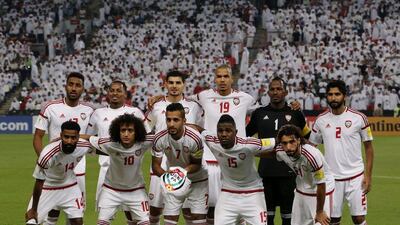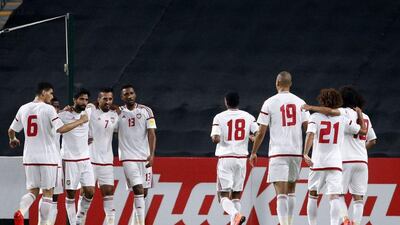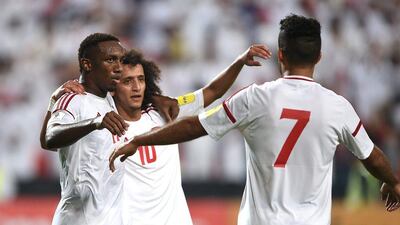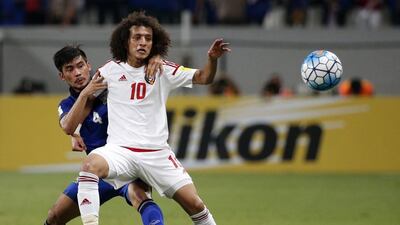Following the UAE’s 3-1 victory over Thailand in their latest 2018 World Cup qualifying match, John McAuley looks at the big talking points as the national team prepare for their next showdown, against Saudi Arabia on Tuesday.
Tariq Ahmed deserves another start
Amer Abdulrahman usually anchors the UAE midfield alongside Khamis Esmail, however the Al Ain star has been out of form for some time. Against Thailand on Thursday, Mahdi Ali opted for Tariq Ahmed instead, reward for the midfielder’s consistent performances at Al Nasr. Ahmed, pictured bottom right, may not possess Abdulrahman’s passing ability – which, admittedly, has not been in evidence lately – but he is both industrious and combative, a persistent runner who offers added protection to the defence. Whether Mahdi Ali sticks with Ahmed in what is sure to be an intimidating atmosphere in Jeddah remains to be seen. Yet the Nasr man has certainly done enough to merit another crack.
UAE must be more clinical
Ali Mabkhout scored twice against Thailand, the first fortuitous, the second a textbook break away and thunderous finish. He should have had at least one more, though, especially when he struck the crossbar with a first-half header. Despite the double, Mabkhout, pictured third left, seemed a little below par, with his control uncharacteristically letting him down at various times. His teammates, too, were not as clinical in the final third as they should have been. Mahdi Ali said as much post-match, but was quick to point out that his side still scored three times. Against Saudi, they might create fewer chances. Thus, they will need to make them count.
Ahmed Khalil’s return to fitness is vital
As expected, Ahmed Khalil began Thursday’s match on the bench. The UAE striker, pictured left, had not trained for four days, and with Saudi looming, Mahdi Ali chose not to risk injury to his lead forward. Introduced in the 75th minute, Khalil scored the UAE’s third goal right at the death. It took his tally in qualification for this World Cup to 14 goals, and comes after his double in last month’s victory against Japan. The reigning Asian player of the year, Khalil provides a real presence up front, someone the Saudis will no doubt be concerned about. He scored the last time the two teams met in Jeddah, last year.
Right-back continues to be an issue
Mohammed Ahmed’s injury against Australia last month, and subsequent surgery, has left Mahdi Ali with a slight problem at right-back. Abdulaziz Haikal is the obvious replacement, but he reverted to the bench on Thursday, with Mohammed Fawzi starting. The Al Jazira right-back helped create the UAE’s opener – his cross eventually found its way to Ali Mabkhout – however he was caught out of position for Thailand’s goal. Sometimes prone to lapses in concentration, Fawzi will need to be fully focused if he starts against Saudi, while Haikal’s temperament can also be questionable. No matter who plays, they will need support from midfield.
Fresh legs required for Saudi
From just after the hour on Thursday, the UAE struggled to dictate against Thailand, with the visitors scoring and then having numerous opportunities to equalise. At that point, the hosts looked tired, something Thai manager Kiatisuk Senamuang noted post-match. Fortunately for the UAE, they have a number of players to come back into the side if needed, such as Ahmed Khalil, Amer Abdulrahman and Abdulaziz Haikal. Habib Fardan can also freshen up the attacking midfield positions, while the experienced Walid Abbas could return in defence.
A five-day turnaround is not too tough, but the Saudi match requires a huge effort. The UAE must be at the top of their game.
Follow us on Twitter @NatSportUAE
Like us on Facebook at facebook.com/TheNationalSport






